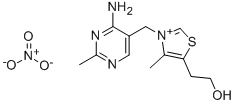Thiaminnitrat
|
|
Thiaminnitrat Eigenschaften
- Schmelzpunkt:
- 374-392 °C
- Dichte
- 1.58 g/cm3
- storage temp.
- 2-8°C
- L?slichkeit
- Sparingly soluble in water, freely soluble in boiling water, slightly soluble in alcohol and in methanol.
- Aggregatzustand
- solid
- pka
- 4.8(at 25℃)
- Farbe
- White to Off-White
- Geruch (Odor)
- wh. cryst. or cryst. powd., sl. char. odor
- Biologische Quelle
- synthetic
- Merck
- 14,9295
- BRN
- 3857790
- Stabilit?t:
- Stable. Incompatible with strong oxidizing agents.
- InChI
- InChI=1S/C12H17N4OS.NO3/c1-8-11(3-4-17)18-7-16(8)6-10-5-14-9(2)15-12(10)13;2-1(3)4/h5,7,17H,3-4,6H2,1-2H3,(H2,13,14,15);/q+1;-1
- InChIKey
- UIERGBJEBXXIGO-UHFFFAOYSA-N
- SMILES
- [N+]1(CC2=CN=C(C)N=C2N)C(C)=C(SC=1)CCO.[N+]([O-])([O-])=O
- CAS Datenbank
- 532-43-4(CAS DataBase Reference)
- EPA chemische Informationen
- Thiamine nitrate (532-43-4)
Sicherheit
| S-S?tze: | 22-24/25 | ||
|---|---|---|---|
| WGK Germany | 1 | ||
| RTECS-Nr. | XI7400000 | ||
| TSCA | Yes | ||
| HS Code | 29362200 |
Thiaminnitrat Chemische Eigenschaften,Einsatz,Produktion Methoden
S-S?tze Betriebsanweisung:
S22:Staub nicht einatmen.S24/25:Berührung mit den Augen und der Haut vermeiden.
Beschreibung
Thiamine is a water-soluble vitamin with antioxidant, neuroprotective, and anxiolytic properties. It inhibits lipid peroxidation in rat liver microsomes and free radical oxidation of oleic acid in vitro when used at concentrations ranging from 1 to 100 μM. In vivo, thiamine (100 mg/kg) reduces hepatic levels of aspartate aminotransferase (AST) and alanine aminotransferase (ALT), lipid peroxidation, and protein damage in a rat model of acute ethanol intoxication. It reverses predator stress-induced suppression of hippocampal neurogenesis and decreases the latency of step-down from a platform, indicating anxiolytic-like activity in mice. Thiamine (8.5 mg/100 g food) reduces neurodegeneration and increases survival in Slc19a3-/- mice, a model of thiamine metabolism dysfunction syndrome-2 (THMD-2).Chemische Eigenschaften
White or almost white, crystalline powder or small, colourless crystals.Verwenden
Thiamine Nitrate is an orally administered vitamin. Thiamine is a essential nutrient required for carbohydrate metabolism and is involved in nerve function.benefits
Some of the critical uses and benefits of Vitamin B1 Mononitrate(Thiamine nitrate) include:Supports Energy production: Thiamine nitrate is involved in converting food into energy, particularly in the metabolism of carbohydrates.
Helps Nervous system: Thiamine nitrate is essential for proper nervous system function and is involved in transmitting nerve impulses.
Improves Cardiovascular health: Thiamine nitrate is important for maintaining healthy heart function, and may help to reduce the risk of heart disease.
Supports Appetite regulation: Vitamin B1 mononitrate is involved in regulating appetite and may help to reduce the risk of overeating and weight gain.
Improves Eye health: Thiamine nitrate is involved in maintaining healthy eye function, and may help to reduce the risk of certain eye disorders.
Allgemeine Beschreibung
Certified pharmaceutical secondary standards for application in quality control, provide pharma laboratories and manufacturers with a convenient and cost-effective alternative to the preparation of in-house working standards. Thiamine Nitrate is a mononitrate salt of thiamine. It is synthesized from thiamine hydrochloride following a sequence of steps. Thiamine Nitrate is used as a dietary supplement in crackers, eggs substitute and enriched flour.Sicherheitsprofil
Poison by intravenous and intraperitoneal routes. A powerful oxidizer. When heated to decomposition it emits very toxic fums of SOx, and NOx. See also NITRATES.Thiaminnitrat Upstream-Materialien And Downstream Produkte
Upstream-Materialien
Acetamidiniumchlorid
Ammoniak, wssrige Lsung
(2-METHYL-1H-INDOL-3-YL)-OXO-ACETIC ACID ETHYL ESTER
Chinolin
Pyramat
3-Methoxypropiononitril
N-ACETYL-D-GALACTOSAMINE(GALACTOSE-13C6, 99%)
Thiaminhydrochlorid
Downstream Produkte
Thiaminnitrat Anbieter Lieferant Produzent Hersteller Vertrieb H?ndler.
Global( 496)Lieferanten
| Firmenname | Telefon | Land | Produktkatalog | Edge Rate | |
|---|---|---|---|---|---|
| Aurora Industry Co., Ltd. | +86-13591747876 |
alex1_auco@126.com | China | 300 | 58 |
| Hebei Yanxi Chemical Co., Ltd. | +8618531123677 |
faithe@yan-xi.com | China | 5853 | 58 |
| Wuhan Fortuna Chemical Co., Ltd | +86-027-59207850 +86-13986145403; |
info@fortunachem.com | China | 5919 | 58 |
| Hebei Chuanghai Biotechnology Co,.LTD | +86-13131129325 |
sales1@chuanghaibio.com | China | 5251 | 58 |
| airuikechemical co., ltd. | +86-18353166132 |
sales02@airuikechemical.com | China | 983 | 58 |
| Shaanxi TNJONE Pharmaceutical Co., Ltd | +86-17396673057 |
linda@tnjone.com | China | 1143 | 58 |
| Hebei Zhuanglai Chemical Trading Co Ltd | +86-16264648883 |
niki@zlchemi.com | China | 7245 | 58 |
| Henan Tianfu Chemical Co.,Ltd. | +86-0371-55170693 +86-19937530512 |
info@tianfuchem.com | China | 21622 | 55 |
| Hefei TNJ Chemical Industry Co.,Ltd. | +86-0551-65418679 +8618949832763 |
info@tnjchem.com | China | 2986 | 55 |
| Tianjin Zhongxin Chemtech Co., Ltd. | 86-22-66880623 +8618622897568 |
sales@tjzxchem.com | China | 572 | 58 |
532-43-4(Thiaminnitrat)Verwandte Suche:
Folsure
Methylacrylat
Thiaminhydrochlorid
1-[2-[(4-Chlorphenyl)methoxy]-2-(2,4-dichlorphenyl)ethyl]-1H-imidazoliumnitrat
9,10-Secocholesta-5,7,10(19)-trien-3-ol
NITRATE
Benzothiazol
Thiamin
2-Methyl-2H-isothiazol-3-on, innicht atembarer Form
Fosthiazate
Bensulfuron methyl
Miconazole Nitrate
Di(benzothiazol-2-yl)disulfid
Methyl-4-hydroxybenzoat
Benfotiamin
Cocarboxylase
Thiophanat-methyl
Ascorbinsure
- mnitrate
- nitrate(salt)
- thiaminenitrate(salt)
- D03277
- Thiamine nitrate (jp15)
- Vitanon
- Vitanon (tn)
- 3-[(4-amino-2-methyl-5-pyrimidinyl)methyl]-5-(2-hydroxyethyl)-4-methyl-, nitrate (salt)
- VitaMin B1 HNO3
- Rocoat Thiamine Mononitrate 33 1/3 %
- Thiamine Mono 98% DC
- THIAMINE (VITAMIN B1) MONONITRATE(P)
- 3-((4-aMino-2-MethylpyriMidin-5-yl)Methyl)-5-(2-hydroxyethyl)-4-Methylthiazol-3-iuM nitrate
- ThiaMine Monon
- Thiamine nitrate AldrichCPR
- thiamine, hidrochloryde
- Thiamine nitrate 95%
- Vitamin B1 Nitrate 〔Thiamine Nitrate〕
- BETABION NITRATE
- ANEURINE MONONITRATE
- ANEURINE NITRATE
- Thiaminenitratel
- Thiazolium,3-[(4-amino-2-methyl-5-pyrimidinyl)methyl]-5-(2-hydroxyethyl)-4-methyl-,nitrate(salt)
- vitaminb(sub1)nitrate
- Thiaminenitrate,98%
- Vitamine B1(mono)
- 3-(4-AMINO-2-METHYLPYRIMIDYL-5-METHYL)-4-METHYL-5-(B-HYDROXYETHYL)THIAZOLIUM CHLORIDE MONONITRATE
- 3-[(4-amino-2-methyl-5-pyrimidinyl)methyl]-5-(2-hydroxyethyl)-4-methylthiazolium nitrate
- THIAMINE NITRATE
- THIAMINE MONONITRATE USP
- Thaimenitrate
- THIAMINEMONONITRATE,FCC
- Thiaminnitrat
- 3-(4-amino-2-methylpyrimidyl-5-methyl)-4-methyl-5,beta-hydroxyethylthiaz olium nitrate
- 3-(4-amino-2-methylpyrimidyl-5-methyl)-4-methyl-5,beta-hydroxyethylthiazoliu
- betabionmononitrate
- Vitamine B1 mononitr-ate
- 2-[3-[(4-amino-2-methyl-5-pyrimidinyl)methyl]-4-methyl-5-thiazol-3-iumyl]ethanol
- Vitamin B1 mononitrate Solution
- Thiamine nitrate CRS
- Thiamine nitrate USP/EP/BP
- Thia532-43-4mine Nitrate
- 99.9% Purity Thiamine Nitrate Powder 532-43-4 with Best Price
- Thiamine nitrate (Y0001758)Q: What is Thiamine nitrate (Y0001758) Q: What is the CAS Number of Thiamine nitrate (Y0001758)
- Thiazolium,3-[(4-amino-2-methyl-5-pyrimidinyl)methyl]-5-(2-hydroxyethyl)-4-methyl-,nitrate (1:1)
- vitamin Bl mononitrate
- ThiaMine Monohydrate
- Thiamin Mononitrate
- Vitamin B1 Mono
- THIAMINE MONONITRATE
- VITAMIN B1 MONONITRATE
- VITAMIN B1 NITRATE
- Thiamine Nitrate, ≥ 98.0%
- C17455500 ThiaminEmononitrate
- Ethyl Acetate Impurity 122
- Thiamine nitrate, 10 mM in DMSO
- 532-43-4
- 532-43-1







